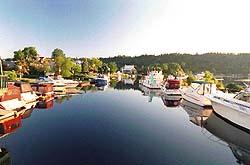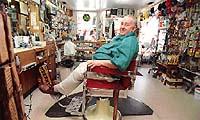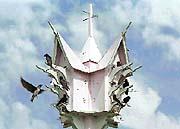PART V OF VI: WESTPORT



|
| The water sits like glass in the Westport harbor. What was once a "floating bog" is now a thriving resort area thanks to community support. |

|
| Gary "Fetch" Murphy relaxes in his Westport barbershop and fishing tackle store. The 62-year-old has been trimming area locks for 45 years. |

|
| A massive blue heron skims the midday waters of the Rideau Canal. It's hard to pass a day on the river without encountering at least one of these majestic birds. |

|
| Westport's waterfront is home to all forms of life. This birdhouse stands like a sentinel at the entrance to the harbor. |